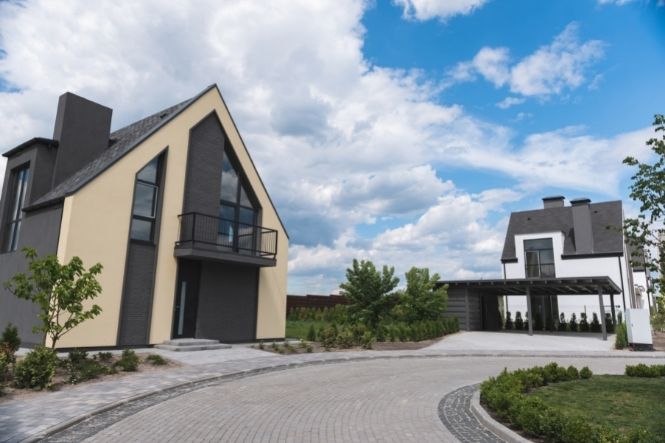When you’re lying around the house, pondering some creative, home improvement ideas, the driveway isn’t usually at the top of the list. However, since it’s literally the first thing anyone sees as they pull into your drive, it’s the perfect spot to start a renovation project.
The best thing about improving your driveway is that there are so many different and viable options to really make it stand out while maintaining construction integrity and durability for long-term use.
So if you’re ready to embark on a driveway renovation project, the best place to start is the driveway itself, along with what kind of materials you want to use.
Table of Contents
Popular Driveway Types
Standard concrete will get the job done but, let’s be honest, it’s rather a boring look. Also, concrete is prone to cracking when it contracts and expands over time, even if it is properly segmented to allow for some “breathing” room. What are some popular options then?
- Cobblestone
- Brick
- Indian Stone
- Bound Resin
Cobblestone Driveways
Cobblestonedriveways are best for flat driveways, not sloped, since they tend to be very slick when it rains. On the bright side, they’re a great idea if you’re going for a “period” look and it will really enhance the overall appeal of your home.
The up-front expense for a cobblestone driveway is pretty extensive, perhaps mostly because of its rarity. However, long-term expenses are negligible because they are very easy to repair.
It’s also an extremely durable surface that will last a long time and is highly resistant to any sort of staining. Remember, some of the ancient roads that still remain today are a form of cobblestone paving.
Brick Driveways
Although brick pavers may not be as aesthetically nostalgic as cobblestone, it has all of their strengths with none of their weaknesses. Brick—especially the deep, rich red often used in home construction—certainly has its own fanbase.
For those who prefer brick, there are plenty of great reasons to use it to form your driveway. Unlike cobblestone, it’s slick-resistant. No matter the weather, the brick will provide at least a modicum of traction, even under a deep freeze.
It’s also a very “breathable” construction material, meaning that it will expand and contract with the soil beneath it, eliminating all of that industrious cracking that’s so prevalent in concrete driveways.
Its aesthetic appeal isn’t completely reliant on red either. There are so many variations in brick colors and designs that you can approach the cobblestone look if that’s your preference.
Most important, brick is extremely durable. They can tolerate heavy vehicles throughout the daily grind of repeated driveway use. They’re also very weather-resistant and are not prone to cracking.
Indian Stone Driveways
Indian stone strongly resembles the large tiles you may find in kitchens or in bathrooms, depending on the modern designs are in newer homes. Of course, it has that modern, new-age home vibe, reminiscent of towering, high-tech office space and glass-walled, open-floor design space.
If that modern appeal is your thing, an Indian stone driveway may be the perfect, welcoming aesthetic for your home. Like cobblestone, Indian stone paving is preferably on a flat driveway. It’s difficult to curve large tiles and it loses some of its durability on slopes.
It doesn’t get slick in rainy weather but only if you use a porous material. However, it’s very durable paving and it has an incredible look and feels as well. It’s resilient enough to tolerate light vehicle traffic, though you probably shouldn’t park a big rig on it.
Another benefit of Indian stone paving is that it fits so well in any environment that you can easily extend it to patios and garden walkways, rather than just focusing specifically on your driveway.
Bound Resin Driveways
Bound resin driveways are another popular design choice, partly because you can do so much with it—including with colours and design aspects—and it’s very colour stable with a high UV resistance.
It doesn’t matter what the angle of your driveway is because the bound resin can be incorporated into any geographical feature. Whether it’s long, elegant curves, extreme hills, or sharp angles, bound resin will work.
Since it has a permeable surface, its slip-resistant in adverse weather conditions, with the water draining through the material and into the soil beneath. It’s durable enough to tolerate frequent, light vehicle traffic along with pedestrians and ATVs.
With a seamless, slick-looking surface, it has its own aesthetic appeal for those who are interested in using it. There are also bonded resin driveways but they lack several of the superior features of bound resin, so that didn’t make the list.
All Things Considered
There are many popular choices available when it comes to constructing a new driveway and you are welcome to get as creative as you want with any of the materials above. At the same time, you’ll know that you’re getting a quality, durable and long-lasting surface.
Regardless of what you decide to go with, the creativity only begins with the driveway itself. There’s more to a driveway than just the paving, after all. So choose wisely, because all of your driveway projects stem from here.


